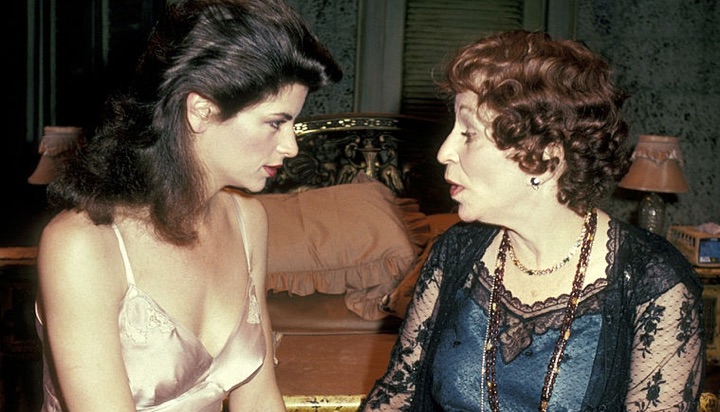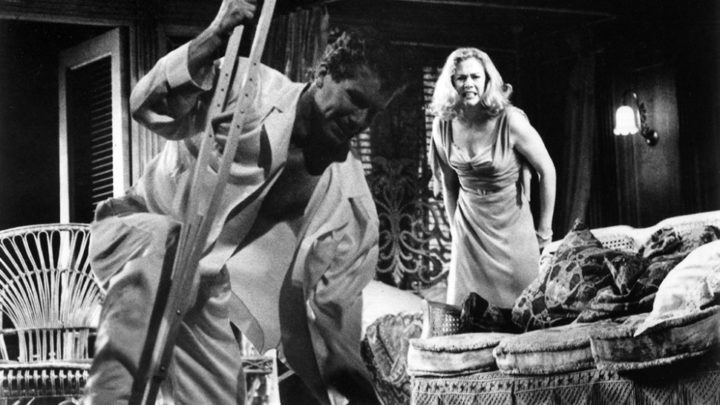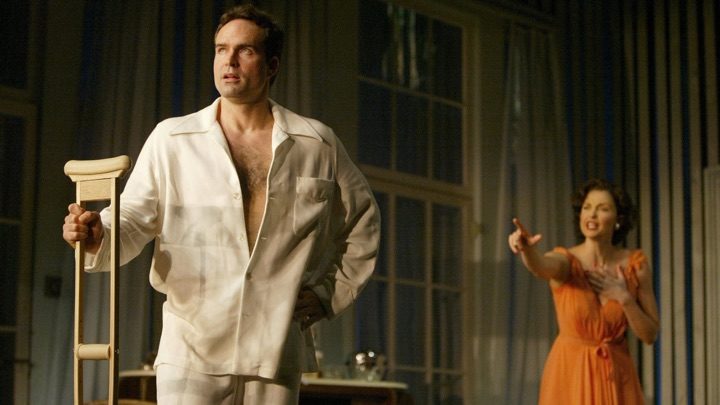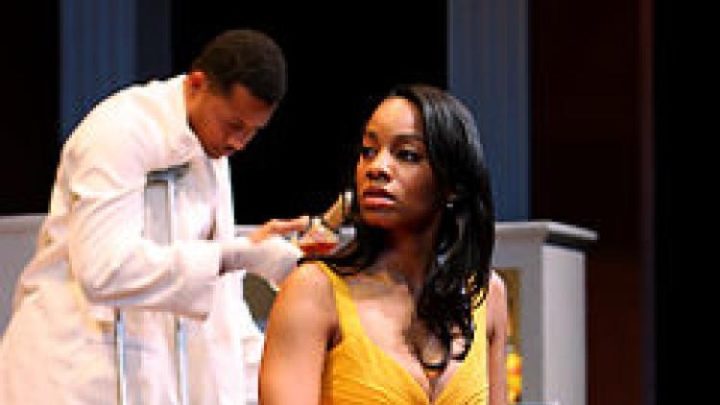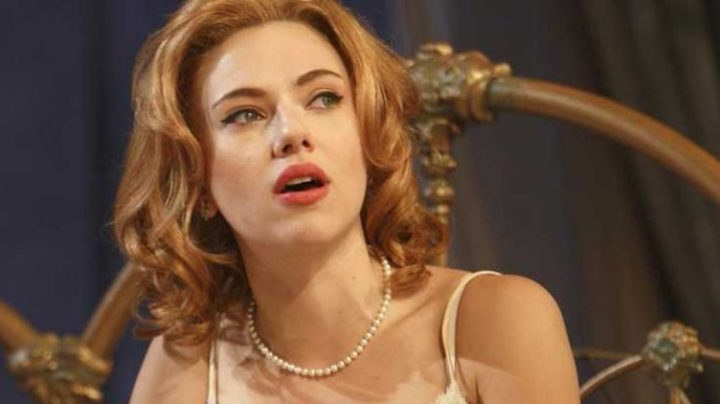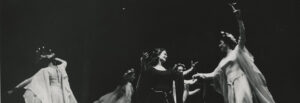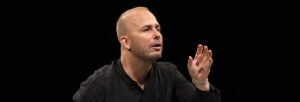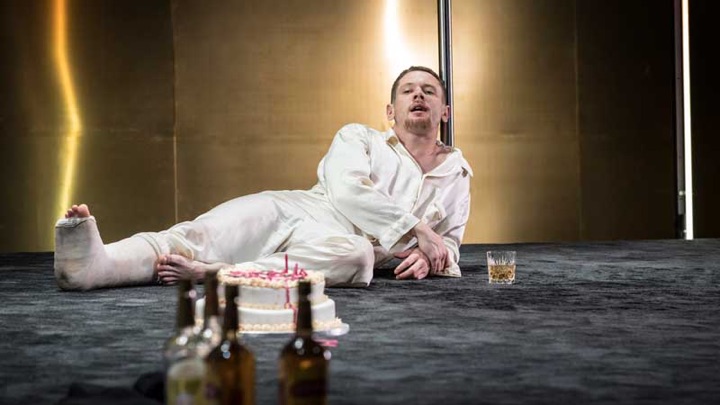
David Fox: The sobering (for me) reality is that my first Cat—a 1983 Los Angeles production with the kind of dazzlingly bizarre grab-bag casting one used to get there—was well before you were born! In any event, I think that Cat is the Williams play I have seen most often, on stage and through film. So, shall we share some observations on some of these experiences?
CK: Let’s have at it!
BITS & PIECES: VIDEO & FILM
Video Excerpt from Broadway: The Golden Age, featuring Cat scene with Barbara Bel Geddes and Ben Gazzara
DF: It’s a fool’s errand to try to extrapolate from less than two minutes of film what the stage experience must have been like… but on the other hand, since this excerpt includes what (as far as I know, at least) is the only extant film of Cat’s original Maggie (Barbara Bel Geddes) and Brick (Ben Gazzara) in performance, it is a precious souvenir. For me, he is certainly sexy and compelling, and I’m intrigued by the rather hypnotic manner, but it certainly looks (for better or worse), stage-bound. She seems to me to come vividly to life almost instantly, and is unlike any other Maggie I’ve seen in her girl next door appeal. An actor friend whose taste I trust raved about Bel Geddes in Cat—I can absolutely see why even from this tiny but wonderful bit of evidence.
CK: The idea of Gazzara as Brick always seemed so strange to me on paper—a first-generation Italian American from Brooklyn as the golden-boy son of a Southern plantation family. But even though his accent isn’t particularly convincing, the little sliver of a scene shows that he has the right sexy yet bruised quality for Brick. He and Bel Geddes also read believably as a couple. It’s a treasure, too, that Gazzara was on hand to speak about the show’s opening-night experience. I did end up seeing him onstage once, in a late-career performance of Clifford Odets’ Awake and Sing, and he was still so natural and open.
Benedict Andrews: Sienna Miller, Colm Meaney, Jack O’Connell (National Theatre Live video)
DF: As far as I can tell, the video is not currently available—if so, good riddance. This production played at the Young Vic; it received considerable praise at the time, but I found the NT filmed performance we saw absolutely appalling. It drained the female characters of all semblance of dignity, and completely undermined Williams’ poetry and insight. If you want to read more of my thoughts, here is my full review on Reclining Standards. Or you can just stay away—I would, if I could go back in time.
CK: I have nothing to add, except that Sienna Miller’s attempt at a Southern drawl belongs in the Bad Accent Hall of Fame.
STAGE PRODUCTIONS
Jose Quintero: Kirstie Alley, Pat Hingle, James Morrison (Mark Taper Forum, Los Angeles, 1983)
DF: This must be the motliest crew ever assembled for Cat: Kirstie Alley (Maggie), James Morrison (Brick), Peter Jurasik (Gooper), Patricia McCormack (yes—that’s Patty McCormack of The Bad Seed fame—as Mae), Pat Hingle (Big Daddy) and Alice Ghostley (Big Mamma). Unsurprisingly, I remember it as more effective in parts than as the ensemble piece it should be. Still, individual elements were fascinating. Hingle was predictably excellent as Big Daddy, and Ghostley—funny and touching—at least his equal. McCormack was delightfully bitchy. Morrison? I think he was fine, but my most vivid impression is that he was so sexy in his silk pajama bottoms that I had erotic dreams about him for weeks after. Alley’s career obviously went in a very different direction—Cheers and Fat Actress were years ahead. She was entirely new to me, and I thought she was a highly satisfying and often terrific Maggie—feisty, funny, and stunning to look at.
Howard Davies: Kathleen Turner, Charles Durning, Daniel Hugh Kelly (Broadway 1990)
DF: On paper, the idea of Kathleen Turner—who by then had seduced the world in Body Heat, and charmed us in Peggy Sue Got Married—seemed so promising, but the result was much tamer and less compelling than one hoped for. It was Charles Durning, an electrically charged, hyperbolic Big Daddy, who really walked away with the show. Kevin O’Rourke (Gooper) was unmemorable; more problematically, so was Daniel Hugh Kelly, though he looked good in pajamas. (I think his career was largely spent on soap operas.) Polly Holliday had good moments as Big Mama; Debra Jo Rupp was funny as Mae, though she is one of many who seemed to me too cartoonish. And honestly, that’s about it.
Anthony Page: Ashley Judd, Ned Beatty, Jason Patric (Broadway 2003)
CK: The takeaway from this production was Ned Beatty’s gregarious, casually cruel Big Daddy. Up until the final, crushing coda, he actually believed he had cheated death—and we believed it, too. Unfortunately, Beatty’s brilliant work was overshadowed by an unflattering profile in the New York Times, in which he questioned the talent of his co-stars, Ashley Judd (Maggie) and Jason Patric (Brick). What he said may have been discourteous, but it wasn’t wrong. Judd, another bombshell-level Maggie, seemed to constantly count beats during her Act I monologue, never losing herself inside Maggie’s desperation to regain Brick. Patric was handsome but stiff. The only cast member who approached Beatty’s level was Margo Martindale, a charming and refreshingly forthright Big Mama.
Debbie Allen: Anika Noni Rose, James Earl Jones, Terrence Howard, Phylicia Rashad (Broadway 2008)
CK: This production was envisioned as the first of a series of Broadway revivals that would feature predominantly Black casts in classic American plays. To my knowledge, aside from a 2012 revival of Streetcar starring Blair Underwood and Nicole Ari Parker, other anticipated outings never materialized. Mostly, I recall an elegantly appointed mise en scene—great Jane Greenwood costumes—but not much in the way of insight from the cast or director Debbie Allen. The usually terrific Anika Noni Rose gave an overly mannered and utterly contemporary performance; Terrence Howard, who made waves by comparing the Broadway schedule to slavery, was ill at ease as Brick and seemed to be actively obfuscating any suggestion of his character’s latent homosexuality. As Big Daddy and Big Mama, James Earl Jones bellowed and Phylicia Rashad wept. The production eventually made its way to London, with the far more intriguing Sanaa Lathan and Adrian Lester in the lead roles; wish I’d seen it.
Rob Ashford: Scarlett Johansson, Ciaran Hinds, Benjamin Walker (Broadway 2013)
CK: I’ve said at length that Maggie shouldn’t be played as a sexpot; on the opposite end of that spectrum, she shouldn’t come across as a truck-stop waitress either. Yet that’s what Scarlett Johansson’s dumpy, shrieking take on the character’s put in my mind. Rob Ashford’s production had a handful of compelling supporting performances—Michael Park and Emily Bergl as a refreshingly low-key Gooper and Mae, Debra Monk as a humorous Big Mama—but without a strong Maggie at the center, Cat is pretty much destined to be flea-bitten. The Irish actor Ciaran Hinds made for a maddeningly small-scale Big Daddy, his lines often inaudible from my second-row seat, and entirely lacking in a stature that would suggest a self-made millionaire. Benjamin Walker—nice abs.
DF: Whew! That’s quite a recap. And no doubt, there’ll be more Cats ahead in some distant landscape when theater returns. Till then, shall we say goodnight and put the bottles in a secure place?
CK: Put the bottles away? Honey, if this quarantine lasts any longer, I’m headed for Rainbow Hill!
